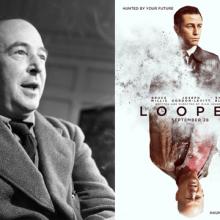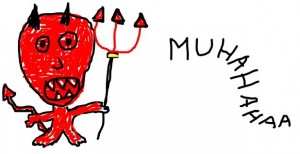Evil

Image via giulio napolitano/Shutterstock
This is where most of us Catholic citizens appear to be, by paying our taxes and going about our lives while our government and our military continue to possess and rely on nuclear weapons. Our Church seems to challenge that we have proportionate reason to do so. For now, we appear to be morally culpable — but less so if we genuinely begin to work toward the elimination of nuclear weapons.
In an interview conducted on Nov. 7, on the eve of the election, and published Friday by an Italian daily, the Argentine pope declined to make any judgment about Trump.
“I do not judge people or politicians,” the pope told Eugenio Scalfari of La Repubblica when asked what he thought of Trump. “I only want to understand what suffering their behavior causes to the poor and the excluded.”

DarZel / Shutterstock
The gospel messes with your tenses and moods (among other things)
The president of the U.S. Conference of Catholic Bishops kicked off a gathering in St. Louis of approximately 250 of the nation’s bishops by referring to Ferguson.
“We mourn those tragic events in which African-Americans and others have lost their lives in altercations with law enforcement,” said a statement prepared by Archbishop Joseph E. Kurtz of Louisville, Ky., which was read by Bishop Ronny Jenkins, general secretary of the U.S. Conference of Catholic Bishops on June 10.
“Racism is an evil which endures in our society and in our church.”
I’ve always had a curious sort of sympathy for the bad guys. I cried when King Kong died. I wept at Darth Vader’s demise. And I felt like the whole melting thing was a little bit harsh for the Wicked Witch of the West.
Maybe they didn’t really want to be bad. Maybe they were just written that way. Could be that they had a rough childhood, or people made fun of them for being green, or big and hairy, or breathing through a big, black mask. I mean, imagine that on the playground …
Ever since my childhood I’ve felt more comfortable in darkness than most kids seemed to as well. My 10-year-old son won’t even go into any unlit room in our house without being accompanied by our dog, Maggie. But I actually enjoyed being in the dark. It seemed like the one place where I could let the otherwise literal, concrete parts of my brain take a rest, and allow my imagination to run wild.
Theologically, we’re taught to hate, or at least fear, the darkness. We are children of light, God called light into being, and it was from this light that all things were formed. So what use do we have for darkness?
From white villages Easter bells resound.
Rejoice! Give thanks! I raise my voice
Evil disappears from the world.
And that means somewhere God must be.
NO ORDINARY MEN: Dietrich Bonhoeffer and Hans von Dohnanyi, Resisters Against Hitler in Church and State is a tightly woven story framed by the sophisticated historical analysis of its two authors, former senior Farrar, Straus, and Giroux editor Elisabeth Sifton (daughter of theologian Reinhold Niebuhr) and Columbia University professor emeritus Fritz Stern, a famed German scholar. The book profiles two brave young men—Bonhoeffer, a theologian and minister deeply involved in fighting the Nazis’ efforts to control the German Protestant churches, and Dohnanyi, a brilliant lawyer (son of Hungarian composer Ernst Dohnanyi) working in the German Ministry of Justice, who used his key position to methodically collect evidence against the Nazi regime.
Sifton and Stern portray Dohnanyi in detail as a leader in the small but high-powered German resistance movement. Brig. Gen. Hans Oster, a resistance member, hired Dohnanyi away from the Ministry of Justice ostensibly to help run the Abwehr, a German military intelligence organization that was also the center of the anti-Hitler resistance, in 1939. Dietrich Bonhoeffer was then recruited by Dohnanyi to be part of this team. Dohnanyi’s wife, Christine (Bonhoeffer’s sister), is also revealed as a significant influence on and aide to her husband.
The slim, 157-page volume is an important new historical work in the growing field of research on the German resistance movement during World War II. It is a penetrating look at Dohnanyi’s dangerous operations against the Nazis with historical perspective that other books on him and Bonhoeffer lack. Earlier biographies, written mainly by church people, more or less emphasized Bonheoffer as a singular hero fighting Hitler. Bonhoeffer was indeed very brave and traveled thousands of miles abroad while working as an agent for the Abwehr, but he was just one of a circle of resisters.
IN OCTOBER, Sojourners hosted a Washington, D.C. premiere for the faith community of the extraordinary film 12 Years a Slave. The compelling story about Solomon Northup—a free man from New York who was kidnapped and sold into slavery—is an accurate and well-produced drama, worth seeing for its cinematic merits, but primarily as a start to a conversation about race in America that is long overdue.
In her New York Times review titled “The Blood and Tears, Not the Magnolias,” Manohla Dargis wrote that 12 Years a Slave “isn’t the first movie about slavery in the United States—but it may be the one that finally makes it impossible for American cinema to continue to sell the ugly lies it’s been hawking for more than a century.” The film reveals how morally outrageous the slave system was, and it is very hard to watch.
The enslavement of millions of people of African descent by white Americans was always violent, and too intense for most white people to really accept the truth. Most white people, white Christians, and white churches tolerated slavery for 246 years. This historically horrendous evil existed because we tolerated it. That’s why evil always continues to exist: because we tolerate it.
What do we tolerate today? We tolerated the gratuitous evil of slavery, and still tolerate the devaluing of black lives. We tolerate completely dysfunctional urban schools, but would we still do so if they were full of young white children? We tolerate a criminal justice system where the racial disparities between white and black arrests, convictions, and sentencing are abundantly clear, resulting in the mass incarceration of men of color. We tolerate murder rates for people of color that we would never tolerate for whites. We tolerate racial profiling of young black men, with results that we would never accept for our white teenage boys. And we tolerate deliberate and clear political efforts to diminish the votes of minority communities.
Star Trek: Into Darkness is a fascinating and complicated story that is well worth watching. Instead of providing a summary, I want to explore three related aspects of the movie: sacrifice, blood, and hope for a more peaceful future.
Live Long and Prosper – The Sacrificial Formula
In a reference to my favorite Star Trek movie, Star Trek II: The Wrath of Khan, the current movie’s Spock (Zachary Quinto) restates the sacrificial formula: “The needs of the many outweigh the needs of the one.” This formula has generally been used throughout human history to justify sacrificing someone else. As René Girard points out, from ancient human groups to modern societies, whenever conflicts arise the natural way to find reconciliation is to unite against a common enemy.
Of course, there’s a lot of this going on throughout the Star Trek franchise. One conversation in Into Darkness explicitly points this out when Kirk (Chris Pine) unites with his enemy Khan (Benedict Cumberbatch), and explains it to Spock:
Kirk: The enemy of my enemy is my friend.
Spock: An Arabic proverb attributed to a prince who was betrayed and decapitated by his own subjects.
Kirk: Well, it’s still a hell of a quote.
TODAY THE Middle East—where about 60 percent of the population is under the age of 25—is a region dominated by humiliation and anger. Failure plus rage plus the folly of youth equals an incendiary mix.
The roots of anti-American hostilities in the Middle East run deep. We can start with the fact that what we consider our oil lies beneath their sands. Couple that with U.S. support of repressive regimes, the presence of foreign troops on their land and in their holy places, and the endless wars waged there, ultimately fueled by the geopolitics of energy. Add to that the unresolved Israeli-Palestinian conflict, which continues to drive the deepest emotions of mutual frustration, fear, and retaliation throughout the Middle East and around the world.
Injustices and violence caused by the oil economy have sparked a reaction from dangerous religious fundamentalists in the Muslim world. Fundamentalism—in all our faith traditions—is volatile and hard to contain once it has been unleashed, and it is hard to reverse its essentially reactive and predictably downward cycle.
Three principles may help us navigate a path out of this mess. First, religious extremism will not be defeated by a primarily military response. Ample evidence proves that such a strategy often makes things worse. Religious and political zealots prefer military responses to the threats created by Islamic extremism. Ironically, this holds true on both sides of the conflict; the fundamentalist zealots also prefer the simplistic military approach because they are often able to use it effectively. Fundamentalists actually flourish and win the most new recruits amid overly aggressive military campaigns against them.
In the church of my childhood it was taught that the “age of accountability” was somewhere around 12. To hit the age of accountability was to, like, spiritually go off of your parents’ insurance. At age 12 the clock starts ticking, spiritually speaking; you know right from wrong now and because of this you are accountable for every time you screw up. And if you sin knowing right from wrong and then die before you chose to be baptized, you might burn in Hell for eternity. So age 12, as you can imagine, is when kids start choosing to get baptized. The lag time between entering the age of accountability and having your slate wiped clean through baptism can be terrifying. Many of us kids would pray not to die in a car crash before we were baptized, like other people pray to not get sick before their employee benefits kick in. So basically, 12-year-old Church of Christ kids experience a wave of devotion like a Great Awakening comprised only of sixth graders. And this is partly because we were all terrified of the devil and temptation and sin. Since, as we were told, all the bad things we’d done may have been washed clean in baptism, but the devil was waiting right outside the baptistery to try and get us to be bad again.
“Oh, God!”
That cry has echoed ever since news of the horrific shooting at Sandy Hook Elementary School in Newtown, Conn.
As the names of those who died are made known, that cry is followed by a question: Why? Why does God allow evil?
This agonizing question arises among religious believers after tragedies great and small. It’s also one that priests, pastors, rabbis, and imams will wrestle with.
The Rev. Jerry Smith of St. Bartholomew Episcopal Church in Nashville said that although this weekend marked the third Sunday in Advent, which focuses on hope in advance of Christmas, the church also has to talk about the reality of evil.
“We have to speak about this shooting and we have to recognize, this is the very darkness that Christ came into the world to dispel,” Smith told The Tennessean.
The Rev. Neill S. Morgan, pastor of Covenant Presbyterian Church in Sherman, Texas, says on the congregation’s website that now is a time for prayer.
But, says Morgan, “all the existential questions about God, justice, and love” will come. “We wonder what we can do to prevent such violence in the world, our nation, and our community.”
As the credits rolled after Looper in a packed Chinatown movie theater in Washington, D.C., I simply sat in reverent silence. Moviegoers on all sides began to rise and quietly leave the theater, but for a brief moment all I could do was just sit there. Quite simply, the movie blew my mind.
When I snapped out of it my thoughts started racing, analyzing the ending, which I won’t ruin for you, and the movie as a whole. It wasn’t a question of whether it was “good” or captivating — those were givens. Rather, I started mining the film’s rich themes and questions, particularly what it said about love.
While sitting there, lost in my mind, I began to notice the music accompanying the names moving onscreen. The song’s chorus sang something like, “I loved you so much that it’s wrong.”
I don’t think the song choice was an accident.
That lyric, I think, illuminates the crux of the film: can something like “Love” — not just romantic love — become perverted? Or, in other words, can our love for one person lead us to do horrible things to others?
There’s a famous maxim that says, “The only thing necessary for the triumph of evil is for good men to do nothing.” Though Wikipedia says otherwise, the statement is often attributed to Edmund Burke.
I doubt that Wikipedia will give me the credit for this 200 years from now, but I’d like to take a crack at a counterpoint to Burke’s famous maxim anyway: Sometimes evil triumphs not when good people do nothing, but when good people fail to distinguish between hypothetical evil and real evil, and end up doing something about the former when they should be doing something about the latter.
Case in point: National Conservative Christian radio host Kerby Anderson’s attempt to rally his followers to thwart the Senate from ratifying the Arms Trade Treaty.
FOR MORE THAN a decade Google Inc. operated with a simple unofficial motto, “Don’t be evil.” And for a long time, the search-engine giant really seemed to be a company driven mainly by the desire to provide a truly excellent service in a manner that put the needs of the user first. Well, that slogan may have been good for a super-geek startup, but it doesn’t seem to work so well for the publicly held global empire Google has become.
Here are a few recent examples of Google behavior that is somewhat less than “not evil.” In March of this year, the company launched a new “privacy” policy that basically consists of warning you that you’re not going to have any. In April, the company was fined by the FCC for privacy violations committed by its infamous “Street View” cars. Apparently, in addition to collecting photographs of random sites on Google Earth, those cars have also been collecting data from unsecured home Wi-Fi networks. Google has also been charged with anti-trust violations for entering an agreement with Apple, Intel, Adobe, Intuit, Pixar, and Lucasfilm to never recruit each other’s employees.
The “don’t be evil” line worked well for Google back in the late 1990s when it could compare itself to Microsoft. That company, in its heyday, was an unabashed incarnation of evil in the best old robber-baron style. It routinely did things like programming your computer to sabotage its competitors’ software. Meanwhile, Google’s main competitor in the search business, Yahoo, was making headlines for turning over dissidents’ web activity to the Chinese government. In those days the ethical high ground wasn’t hard to reach, and Google seized it.
Two years ago during my step-daughter’s final months with terminal cancer, I spent three days in quiet reflecton at Saint John’s Abbey in Collegeville, MN. Worshiping with the Benedictines was part of the structure of my day, the chants and readings opening space for fresh air to enter my angry soul … except for … the Psalms. Outrageously violent, vindictive, intolerant, self-righteous—horrible expressions of emotions I had gone there to revoke.
My friend, Harry Jackson, said that my ideology isn't "Christian" but I suspect what he really means is that it isn't Republican and that's why he disagrees with the things I have said. It's important for Christians to understand those aren't the same thing. I think Bishop Jackson's economic ideology that is indistinguishable from Republican and Tea Party talking points, but I would rather have a civil discussion together as Christians about our differences; rather than his accusing Christians who don't share his conservative economic opinions as coming from "the councils of Hell." C'mon, Harry. I believe the Bible's teachings on wealth and poverty challenge both Republican and Democratic economic views which, sadly, are both often sold out to the interests of the wealthy and large corporations, when they should be focused on the ones Jesus calls "the least of these." Can we discuss that Harry?
JIM WALLIS closed his editorial "Report From Ground Zero" with these words:
I was right with you in your "Report From Ground Zero" until I came to the sentence "If we did not see the face of evil on Sept. 11, we will never recognize it."












